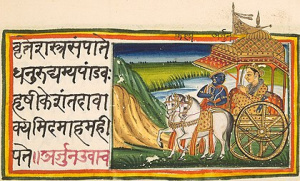Difference between revisions of "Language/Sanskrit"
m (Quick edit) |
|||
| (9 intermediate revisions by one other user not shown) | |||
| Line 11: | Line 11: | ||
Enjoy your learning journey with Polyglot Club! 😊 | Enjoy your learning journey with Polyglot Club! 😊 | ||
==Facts about Sanskrit == | ==Facts about Sanskrit == | ||
Sanskrit is a classical language of South Asia belonging to the Indo-Aryan branch of the Indo-European languages. It arose in South Asia after its predecessor languages had diffused there from the northwest in the late Bronze Age. Sanskrit is the sacred language of Hinduism, the language of classical Hindu philosophy, and of historical texts of Buddhism and Jainism. It was a link language in ancient and medieval South Asia, and upon transmission of Hindu and Buddhist culture to Southeast Asia, East Asia and Central Asia in the early medieval era, it became a language of religion and high culture, and of the political elites in some of these regions. | |||
As a result, Sanskrit had a lasting impact on the languages of South Asia, Southeast Asia and East Asia, especially in their formal and learned vocabularies. | |||
---- | |||
*'''Language code (ISO 639-3)''': <code>san</code> | *'''Language code (ISO 639-3)''': <code>san</code> | ||
*'''Autonyms''' (''how to write "Sanskrit" in Sanskrit''): <code>संस्कृतम्</code> | *'''Autonyms''' (''how to write "Sanskrit" in Sanskrit''): <code>संस्कृतम्</code> | ||
| Line 16: | Line 20: | ||
*'''The Sanskrit language is spoken in''': <code>India</code> | *'''The Sanskrit language is spoken in''': <code>India</code> | ||
===Sources=== | ===Sources=== | ||
https://en.wikipedia.org/wiki/Sanskrit | https://en.wikipedia.org/wiki/Sanskrit | ||
| Line 93: | Line 89: | ||
*'''[https://polyglotclub.com/services/search-jobs/?pg_offre=106 Buy or Sell SERVICES related to Sanskrit]''' | *'''[https://polyglotclub.com/services/search-jobs/?pg_offre=106 Buy or Sell SERVICES related to Sanskrit]''' | ||
==Sanskrit Devanagari Online Virtual Keyboard== | |||
__NOCACHE__<include iframe src='https://polyglotclub.com/keyboard.php?souscat_url=sanskrit' height='600px' frameborder='0' scrolling='yes' /> | |||
== Last Lessons == | |||
[[Language/Sanskrit/Vocabulary/Days-of-the-Week|Days of the Week]] — [[Language/Sanskrit/Grammar/How-to-Use-Have|How to Use Have]] — [[Language/Sanskrit/Grammar/How-to-Use-Be|How to Use Be]] — [[Language/Sanskrit/Vocabulary/How-to-say-Good-Bye|How to say Good Bye]] — [[Language/Sanskrit/Vocabulary/Health|Health]] — [[Language/Sanskrit/Grammar/Give-your-Opinion|Give your Opinion]] — [[Language/Sanskrit/Vocabulary/Express-Surprise|Express Surprise]] — [[Language/Sanskrit/Vocabulary/Geography|Geography]] — [[Language/Sanskrit/Grammar/Gender|Gender]] — [[Language/Sanskrit/Grammar/Future-Tense|Future Tense]] — [[Language/Sanskrit/Vocabulary/Fruits|Fruits]] — [[Language/Sanskrit/Vocabulary/Feelings-and-Emotions|Feelings and Emotions]] — [[Language/Sanskrit/Vocabulary/Education|Education]] — [[Language/Sanskrit/Vocabulary/Drinks|Drinks]] — [[Language/Sanskrit/Vocabulary/Clothes|Clothes]] — [[Language/Sanskrit/Grammar/Negation|Negation]] — [[Language/Sanskrit/Grammar/Plurals|Plurals]] — [[Language/Sanskrit/Grammar/Questions|Questions]] — [[Language/Sanskrit/Grammar/Conditional-Mood|Conditional Mood]] — [[Language/Sanskrit/Grammar/Pronouns|Pronouns]] — [[Language/Sanskrit/Grammar/Adjectives|Adjectives]] — [[Language/Sanskrit/Vocabulary/Food|Food]] — [[Language/Sanskrit/Vocabulary/Colors|Colors]] — [[Language/Sanskrit/Vocabulary/Animal|Animal]] — [[Language/Sanskrit/Vocabulary/Resources|Resources]] — [[Language/Sanskrit/Vocabulary/Family|Family]] — [[Language/Sanskrit/Vocabulary/Plants|Plants]] — [[Language/Sanskrit/Vocabulary/Animals|Animals]] — [[Language/Sanskrit/Vocabulary/Count-to-10|Count to 10]] — [[Language/Sanskrit/Vocabulary/Months-of-the-year|Months of the year]] | |||
<span LastLessons></span> | |||
Latest revision as of 20:44, 25 March 2023
Hi Polyglots! 😃
Welcome to the Sanskrit learning page!
You will find below many free resources to learn and practice this language.
Enjoy your learning journey with Polyglot Club! 😊
Facts about Sanskrit[edit | edit source]
Sanskrit is a classical language of South Asia belonging to the Indo-Aryan branch of the Indo-European languages. It arose in South Asia after its predecessor languages had diffused there from the northwest in the late Bronze Age. Sanskrit is the sacred language of Hinduism, the language of classical Hindu philosophy, and of historical texts of Buddhism and Jainism. It was a link language in ancient and medieval South Asia, and upon transmission of Hindu and Buddhist culture to Southeast Asia, East Asia and Central Asia in the early medieval era, it became a language of religion and high culture, and of the political elites in some of these regions.
As a result, Sanskrit had a lasting impact on the languages of South Asia, Southeast Asia and East Asia, especially in their formal and learned vocabularies.
- Language code (ISO 639-3):
san - Autonyms (how to write "Sanskrit" in Sanskrit):
संस्कृतम् - Other names for "Sanskrit":
Deva Bhasha, Deva vani, Sanskrit bhasha - The Sanskrit language is spoken in:
India
Sources[edit | edit source]
https://en.wikipedia.org/wiki/Sanskrit
Sanskrit Dictionaries[edit | edit source]
• SanskritDictionary: Sanskrit-English dictionary
• SpokenSanskrit: Sanskrit-English dictionary
• SansDict: Sanskrit-English dictionary (compilation)
• Héritage du sanskrit: Sanskrit-French dictionary, by Gérard Huet (2021) + PDF format
• Indo-Tibetan lexical ressources for the study of Buddhism [[new.htm|
• Sanskrit-English dictionary etymologically and philologically arranged, with special reference to cognate Indo-European languages, by Monier Monier-Williams (1899)
+ other version + online search or by alphabetical order (transliteration)
• Practical Sanskrit-English dictionary by Vaman Shivram Apte (1965, revised edition) + online search
• Student's Sanskrit-English dictionary by Vaman Shivram Apte (1891) + online search
• Practical Sanskrit dictionary by Arthur Macdonell (1929) + online search
• Sanskrit-English dictionary by Carl Capeller (1891) + online search
• Sanskrit-English dictionary & etymologies and comparisons of cognate words chiefly in Greek, Latin, Gothic, and Anglo-Saxon, by Theodor Benfey (1866)
• The roots, verb-forms and primary derivatives of the Sanskrit language by William Dwight Whitney (1885)
• Glossarium comparativum linguæ sanscritæ: Sanskrit-Latin dictionary, by Franz Bopp (1867)
• Radices linguæ sanscritæ: roots of the Sanskrit language (in Latin) by Niels Ludvig Westergaard (1841)
• Shabda kalpadrum, an encyclopædic dictionary of Sanskrit (with etymological origins) by Radha Kanta Deva (1967): I & II - III - IV - V
• Cologne University: Sanskrit dictionaries
Sources[edit | edit source]
https://www.lexilogos.com/english/sanskrit_dictionary.htm
Free Sanskrit Lessons[edit | edit source]
Language Exchange[edit | edit source]
Forum[edit | edit source]
Tools[edit | edit source]
Marketplace[edit | edit source]
Sanskrit Devanagari Online Virtual Keyboard[edit | edit source]
Last Lessons[edit | edit source]
Days of the Week — How to Use Have — How to Use Be — How to say Good Bye — Health — Give your Opinion — Express Surprise — Geography — Gender — Future Tense — Fruits — Feelings and Emotions — Education — Drinks — Clothes — Negation — Plurals — Questions — Conditional Mood — Pronouns — Adjectives — Food — Colors — Animal — Resources — Family — Plants — Animals — Count to 10 — Months of the year
